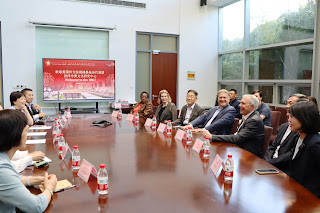Government and Policy Networking at the HNC
One of the wonderful things about the Hopkins-Nanjing Center is that there are many opportunities to connect with professionals whose occupations revolve around China. As a career services student worker, Hailey McGleam 刘霖 (MAIS '23) has had the pleasure of organizing many of these visits. Since the end of the pandemic, those with career interests in China have returned to the mainland in fervor to catch up on lost time. Within the first two months of the academic year, we have had the opportunity to host several sessions of individuals involved in China policy and analysis in the U.S.
U.S. Shanghai Consul General Visit to HNC
In early October, we had a visit from Scott Walker, the new U.S. Shanghai Consul General who has decades of experience in China. As this was a high-level official visit with some of his delegation members, former and current Banwei attended a personal discussion with Mr. Walker. This also highlights the importance of getting involved in student government roles at the HNC. The overall topic was the importance of in-person interactions when it comes to China studies, despite the tension between our countries and the growing capabilities of AI linguistic intelligence. In fact, Mr. Walker highlighted these difficulties are exactly why students from the HNC are so coveted post-graduation, as HNC is the most unique cultural center that exists between American and Chinese universities. In return, students emphasized the importance of pushing for the State Department to reestablish fellowship funding opportunities for China-based programs, including but not limited to the Boren and Fulbright.
Global China Initiative at the Boston University Global Development Policy Center
On October 24, I had the pleasure of touring HNC alumna Tarela Moses and her colleague Zhu Lin around the Hopkins-Nanjing Center and the Nanjing University campus to learn about their experiences in China, and their hopes and concerns for the future of U.S.-China Relations. Tarela was in Nanjing during the 2016 U.S. presidential election and shared with me her unique experience of navigating the election in conversation with her Chinese classmates and how she carries it through her current occupation. I was impressed at her self-determination, whether that be with navigating the struggles of China studies by parents who hadn’t previously been interested in China, to leveraging the HNC education while searching for jobs during the uncertainty of the pandemic. This led to her work at the Boston University Global Development Policy Center, where she focuses on how China's overseas lending and development finance is changing globally and regionally under the Belt and Road Initiative. It was an amazing opportunity to discuss with both Tarela and Zhu about their experiences over lunch, and their subsequent presentation reinforced their invigorating research.
U.S. State Legislative Leaders Foundation
On November 1st, we had the opportunity to talk with current and former American state legislators about U.S.-China relations during what was presently their first experience in China. This included Robert Hertzberg, former majority leader of the California State Senate; Jan Jones, the Speaker pro tempore of the Georgia House of Representatives; David Sokola, the President pro tempore of the Delaware Senate; and Laura Hall, a member of the Alabama House of Representatives. The Beijing branch representative for the non-profit State Legislative Leaders Foundation, Zhao Xiuye, was also in attendance. During this student meeting, we focused on what individual states are doing to support student interest in China, as well as learning about their general interests and impressions of China as an important economic partner of the United States. It was a unique opportunity to impress upon actual policy influencers the importance of providing scholarships for China studies, increasing cross-cultural dialogue to support American industries, and the importance of U.S.-China cooperation on important global issues such as climate change.
Overall, these people-to-people interactions are vital for shaping the insights of students looking to work in government and policy, while at the same time exposing those who influence our experiences as Americans living in China to the hopes and struggles of those they represent. Opportunities like these impart the excitement our HNC students have for being the future leaders of U.S.-China relations, and the hope for more positive dialogue between our countries. Overall, even though grades are important, sometimes it can be the networking opportunities from being involved in HNC events that create long-lasting influences on the careers of our students.




